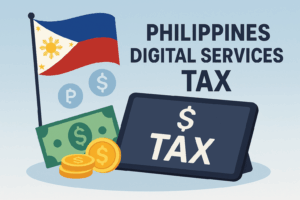The Philippines digital tax refers to the country’s effort to impose taxes on digital services provided by both local and foreign companies.
As the digital economy continues to grow, the government has introduced measures under the PH digital tax law to ensure that online transactions, streaming services, digital advertising, and similar platforms contribute to national revenue.
This move matters not only for international tech giants but also for Filipino businesses and consumers who rely on digital services daily.
The Philippines digital services tax aims to level the playing field between traditional and digital businesses while expanding the country’s tax base.
Understanding how this law works is crucial for anyone engaged in the digital economy—whether as a service provider, user, or investor.
If you are looking to invest as an expat or high-net-worth individual, which is what I specialize in, you can email me (hello@adamfayed.com) or WhatsApp (+44-7393-450-837).
This includes if you are looking for a free expat portfolio review service to optimize your investments and identify growth prospects.
Some facts might change from the time of writing. Nothing written here is financial, legal, tax, or any kind of individual advice or a solicitation to invest.

Are Digital Services Taxable in the Philippines?

Yes. Taxable digital services include a wide range of offerings delivered electronically.
Examples of taxable services under the law include:
- Video and music streaming platforms like Netflix and Spotify
- Online advertising services such as Google Ads or Facebook Ads
- E-book and software downloads
- Cloud storage and computing services
- Online marketplaces and platforms facilitating digital transactions
These categories show that both business-to-consumer (B2C) and some business-to-business (B2B) transactions fall under the tax’s scope.
Understanding what is an example of a digital service in PH helps businesses and consumers determine which online purchases may carry additional tax costs.
PH Digital Tax Law
The proposed House Bill No. 4122, formally known as the Value-Added Tax on Digital Services Law, establishes the legal framework for the Philippines digital tax law.
This legislation aims to impose a 12% value-added tax (VAT) on digital services sold to consumers in the Philippines, whether provided by foreign or local companies.
Under the Philippines digital services tax law, digital service providers (DSPs) will be required to register for VAT with the Bureau of Internal Revenue (BIR) and remit taxes on their taxable sales.
The law is designed to ensure that foreign digital platforms are taxed similarly to local businesses already paying VAT, creating a fairer competitive environment.
The PH digital tax law represents the government’s effort to modernize tax policies and capture revenue from the growing digital economy, particularly as more Filipinos turn to online platforms for entertainment, shopping, and business solutions.
Withholding Tax on Digital Services Philippines
In addition to VAT, certain payments for digital services may be subject to withholding tax on digital services in the Philippines.
For example, when a Philippine business pays a foreign digital provider for online advertising, streaming, or cloud services, it may be required to withhold a portion of the payment as tax before remitting the balance to the provider.
This mechanism ensures tax compliance for cross-border transactions, even when the digital provider has no physical presence in the country.
PH Digital Tax Compliance
Registration and Reporting Requirements for PH Digital Tax
Since both local and foreign DSPs are required to register with the BIR if they exceed the revenue threshold for VAT registration.
As required, once local and foreign DSPs are registered with the BIR, they must charge and collect the 12% VAT on sales of taxable digital services to consumers in the Philippines.
Businesses must also file regular VAT returns and remit the collected taxes within prescribed deadlines.
Individuals earning from digital services such as freelancers, content creators, or cryptocurrency traders involved in taxable transactions, may also need to register as VAT taxpayers and comply with income tax reporting obligations if they meet the required thresholds.
Avoiding Penalties Under PH Digital Tax Law
Failure to comply with the PH digital tax law can lead to penalties, surcharges, and interest imposed by the BIR.
To avoid penalties, businesses and individuals must ensure timely registration, accurate invoicing with VAT, proper tax return filings, and prompt payment of taxes.
Digital platforms should also maintain detailed records of transactions and tax payments to support compliance during audits.
For foreign companies providing digital services to Philippine customers, appointing a local tax representative may help streamline compliance with the Philippines digital services tax requirements.
Seeking professional tax advice is strongly recommended to navigate evolving tax rules and avoid costly mistakes.
The Future of the Philippines Digital Services Tax and Digital Economy Regulation
The implementation of the PH digital tax law marks a significant step in the Philippines’ effort to modernize its tax system and capture revenue from the growing digital economy.
By imposing a value-added tax on digital services provided by both local and foreign providers, the government aims to create a fairer playing field for businesses and improve tax collection from online transactions.
By 2025, assuming a 50% compliance rate, the Department of Finance estimates P7.25 billion in VAT collections.
The new law is expected to yield P105 billion revenue over the next five years.
As covered in this article, businesses offering digital services in the Philippines need to comply with VAT registration, reporting, and tax payment requirements to avoid penalties under the PH digital tax law.
Cryptocurrency traders and individuals earning from digital platforms must also be aware of their tax obligations under existing tax rules.
Looking ahead, the Philippines digital services tax framework may continue to evolve, with potential updates to enforcement, reporting standards, and coverage of new digital products.
Staying informed about regulatory changes will be crucial for businesses and individuals participating in the digital economy.
Pained by financial indecision?

Adam is an internationally recognised author on financial matters with over 830million answer views on Quora, a widely sold book on Amazon, and a contributor on Forbes.



